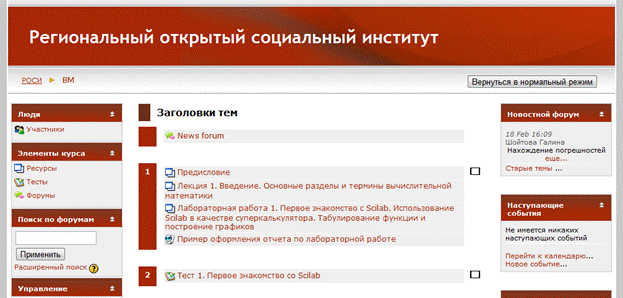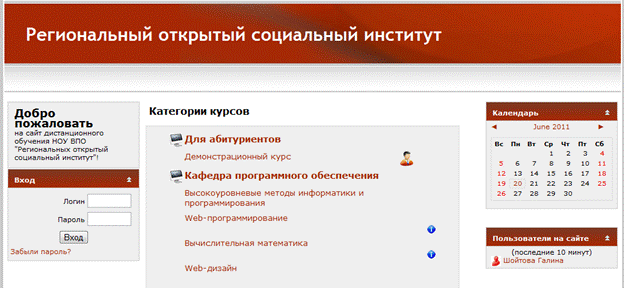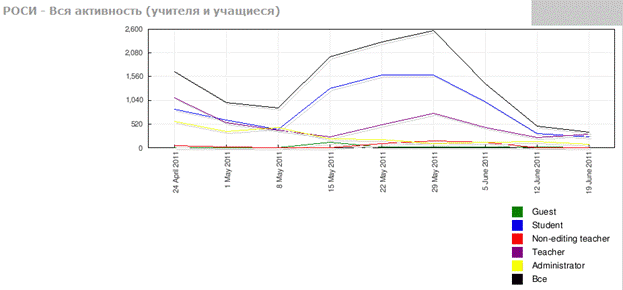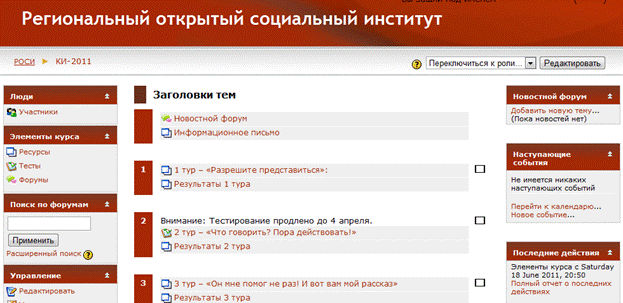The Practical Application of Innovative, “Blended Learning” Techniques in College: As Practiced at the Regional Open Social Institute, Kursk, Russia
DESCRIPTORS: distance learning, blended learning, Moodle, digital course support and development.|
SYNOPSIS: Dr. Shoytova describes the latest innovations in “blended learning” digital education as practiced in Regional Open Social Institute of Kursk, Russia.
***
Nowadays, digital forms of education are becoming an essential component of any modern educational system as they provide new possibilities in: accessing educational information resources; managing educational processes; updating educational resources and their administration; as well as implementing new forms of education through the application of virtual learning techniques which expand the potential of our traditional educational system.
Increased efficiency of educational processes is achieved by combining various forms of digital education with mainstream educational strategies. This technology is called “blended learning.”
The Regional Open Social Institute (ROSI), a non-governmental, educational institution of higher professional education, has accumulated a lot of experience in the area of digital education utilizing blended learning technologies. Suffice it to say that since 2002, we have developed a subject-oriented testing database by utilizing the “Individual Trainer” authoring tool under the leadership of A.N. Churilov, T.V. Ezhova, and E.V. Vlasov. The elaboration of original, learning materials began in 2003. It includes teaching manuals such as “Informatics” which was created by G.Yu. Shoytova and M.V. Borisova; “Computational Mathematics” by G.Yu. Shoytova; “Data Processing Structures and Algorithms” by T.V. Ezhova, G.Yu. Shoytova, and student E.V. Skorobogatyi; as well as “Mathematics” by T.V. Shevtsova, and student E.V. Shamardin. Teacher-student collaboration at the School of IT and Computer Sciences has proved to be very fruitful. However, the implementation of this particular approach has revealed a number of drawbacks including the following:
- Programming tools for the teaching aids described above were based on hypertext markup languages, Delphi (a development environment), C# (a programming language). As the programming phase was mostly done by students under their instructors’ supervision, advanced programming correction of the finished products present certain difficulties for other instructors who were not directly involved in its development.
- It was impossible to carry out course monitoring since odd courses were not built into the global, college database. As a result, there was no monitoring of student off-class self-study.
- Although the “Individual Trainer” authoring tool did contain a data base of tests and control modules, its use was extremely difficult for the faculty because the data bases needed to be regularly converted by the college IT specialists. There was no possibility to integrate flexible testing and monitoring systems into the existing courses.
Several methods were suggested in order to solve the above problems. Among them were:
- Selection of a virtual learning, course management system. There are a great number of integrated virtual learning management platforms available, including both Russian products such as: Virtual University [www.openet.ru]; Docent [www.uniar.ru]; or Prometeus [www.prometeus.ru]; and foreign tools like: Blackboard [www.blackboard.com]; WebCT [www.webct.com]; IBM Lotus LearningSpace [www.lotus.com]; ITS Learning [its.solution.no]; eLearning [www.elearn.ru]; or Moodle [www.moodle.org].
- Since 2009 we have been using the open source course management system known as Moodle (Modular Object Oriented Digital Learning Environment) to implement a full-fledged process of digital education. This is a freely distributed (under the GNU General Public License) popular, international, virtual, learning environment featuring a wide range of options: creation and presentation of learning material; knowledge progress monitoring and control; evaluation and grading; easy implementation of a modular approach in education; user-friendly, extended, teacher-student feedback which enables the student to publish his/her homework online, receive teachers comments, get mistakes corrected and explained by the teacher, resubmit papers for assessment, and receive necessary online consultations. We may also point out such advantages of Moodle as: a simple, “light,” web-interface; an emphasis on interaction between students; an application for both virtual education, full-time tuition, and “blended learning”; an authenticated access policy; the gradation of rights (administrator, course creator, teacher, tutor, student); a personal account editing option (personal info, details, photos); course support structures (calendar, forum, tree); a wide range of course component modules (Forum, Journal, Quiz, Resource, Glossary, Choice, Survey, Assignment, etc.); the ability to edit texts (resources, forum messages, journal entries, etc.) using the built-in text editor; a grades summary on one page (or in a separate file); the availability of a full report when the user is logged in the system and works on various modules; support for any digital content (HTML-text; link to an article or book; uploaded file – any file uploaded to the course is displayed; etc.); assigned submission dates, number of attempts, maximal grade for assignments or quizzes; the ability to create a testing data base that allows for the creation of multiple quizzes; automatic, quiz-results assessment (Students’ answers may be reevaluated manually when the course needs correction.); a variety of question types such as yes/no, multiple choice of one option, multiple choice of several options, open answer, correspondence, etc. Types of questions may be easily added by installing new plug-ins.
- Required hardware installation and setup. Moodle is based on Open Source web-platform and Apache web-server. Its program code is written in PHP language. These are all state-of-the-art and popular software development tools. That is why one of the main and popular features of Moodle is its compatibility with any commonly used operating systems. This feature allows students and faculty of the Regional Open Social Institute to have a remote access to the college’s courses.
- Training to work with Moodle. The primary source of information about Moodle is its official web-site. In addition, there are many manuals and guidelines on Moodle. Some of them are translated into Russian. It should be noted that the system offers an intuitive, user-friendly, graphic interface translated into 61 languages including Russian. The first Moodle enthusiasts at ROSI started to explore the system on their own in 2008-2009. The implementation of Moodle at the college level in 2010 initiated the necessity of teaching manuals for Moodle users. As a result, the Teaching in Moodle textbook was published. This guide is based on the practical utilization of the Moodle manual within the ROSI course “Computational Mathematics.” The project coordinators are constantly updating the textbook and mentoring the Moodle forum for the faculty. We have also held a number of workshops and individual consultations for the faculty. Three tutors have been trained to provide counseling and develop new Moodle materials.
- Moodle’s potential for digital course support and development. The Moodle system enables development of complex integrated courses in selected subjects so that students may use them online even if there is no contact with the professor. Course materials may be presented in a variety of forms including pictures, graphics, maps, video, flash-animation, audio, tables, and text. It is possible to create various learning materials such as books, lectures, workshops, lessons, diagnostic materials in the form of quizzes, test papers, and self-reflection questionnaires to provide necessary feedback to learners. Moodle includes the following basic options: development and publication of educational information in various forms from a simple text through hypermedia content; built-in WYSIWYG editor of teaching materials; online and offline communication of educational environment participants by means of forums, chats, e-mail, and comments; built-in WYSIWYG editor of teaching materials; built-in testing, control and assessment system; a built-in test development system with a wide range of assignment types; organizational and administrative management; a calendar plan; SCORM batches run-time; built-in roles (administrator, course creator, teacher, student); authorization support via LDAP catalogue or any data base; batch registration of new users as well as auto-registration; guest access to courses; access by key; personal profiles; various types of reports; a user’s activity log; output management for various information modules; correction ability for the color scheme and user interface display; virtual technologies may be oriented to different types of learners in various science fields; and finally, multiple forms and methods of educational organization may be used to achieve its efficiency.
- To develop virtual courses, ROSI uses a local-based authoring tool installed in the teacher’s server because not all faculty members have high-speed access to our Moodle website. When we developed the first virtual course in 2009, we made use of the Denwer local server to publish Moodle content online. However, the server’s setup requires a highly-qualified web-programmer. We were not always able to offer such help to our faculty. So when we launched our Moodle project in 2010, we selected Poodle, a portable version of Moodle. This software includes the following components: “Portable Apps,” an open source package to run portable applications directly from a flash drive (http://portableapps.com/); “Mozilla Firefox ®, Portable Edition,” the popular Mozilla Firefox web-browser complete with start-up PortableApps.com (http://portableapps.com/apps/internet/firefox_portable); “Sumatra PDF Portable.” Sumatra PDF is packaged as a portable app, makes it possible to view PDF files in the same environment (http://portableapps.com/apps/office/sumatra_pdf_portable); “MiniServer” which is a cut-down version of the Uniform Server for portable use. The Server is an integrated package Apache Server, MySQL, PHP, and Perl run from a hard drive (http://www.uniformserver.com/); and “Moodle” which is a Learning Management System (http://moodle.org/).
- Implementation of Moodle at the Regional Open Social Institute. ROSI’s first virtual education website was launched in early 2010 with the only existing course – “Computational Mathematics” which was developed by the author of this article. The course was designed for distant and full-time students of the School of IT and computer sciences specializing in computer and automated system software and applied IT in management. The results of the experiment showed that Moodle was a convenient tool to support educational process both for teachers and learners. Our students asked that other Moodle courses be included within the academic program. “Computational Mathematics” content was input in Moodle within one month. It included 9 lectures, 8 laboratory assignments, 500 unit testing data base, a bibliography, and a subject-oriented forum.

Picture 1. “Computational Mathematics” digital learning resource.
Since September 2010, the Regional Open Social Institute has been using Moodle as a full-fledged support for “blended learning” in all departments. “Blended learning” is implemented in 58 courses in all subjects of our academic plan. At present, approximately 20 faculty members and over 600 students are using this system.

Picture 2. Regional Open Social Institute’s digital learning website. The site attracts high attendance.

Picture 3. ROSI digital learning website attendance chart for May-June, 2011.
We are also developing projects for elementary and high school children as a part of our “IT Academy” activity. Our last contest involved 16 teams from the city of Kursk and the Kursk Region.

Picture 4. ROSI IT contest for high school students
During the academic year of 2011-2012, the Regional Open Social Institute is planning to enroll students who will use virtual technologies integrated in the syllabus.
In conclusion, it is important to emphasize that advanced informational technologies make it possible to implement the “blended learning” system in college within a short period of time. The experiment to integrate Moodle in the Regional Open Social Institute’s academic program has proved the efficiency of “blended learning” technologies.
References:
- http://www.moodle.org
- http://www.maflt.org/products/poodle
- Andreev A.V., Andreeva S.V., Dotsenko I.B., “Implementing Digital Education Via Moodle” – TTI YuFU, p. 146, 2008 [in Russian]
- Myasnikova T.S., Myasnikov S.A., “Moodle: A Virtual Education System,” p.232, Kharkov, 2008. [in Russian]
- Shoytova G.Yu., Borisova M.V., “Informatics, A Digital Educational Resource,” 2003-2005. [in Russian]
- Shoytova G.Yu., Computational Mathematics, Software certificate of product regional registration # 7289 dated November 26, 2006 [in Russian]
- Shoytova G.Yu., Ezhova T.V., Skorobogatiy E.V., Sorting Algorithms, Software certificate of product regional registration # 8542 dated June 22, 2007; VNITTs registration # 50200701301 dated June 26, 2007 [in Russian]
- Shoytova G.Yu., Computational Mathematics (Moodle based virtual course,) 2009. [in Russian]
- Shoytova G.Yu. Discrete Mathematics, (Moodle based virtual course,) 2010. [in Russian]
- Shoytova G.Yu., Hypertext Markup Languages, (Moodle based virtual course,) 2010. [in Russian]
- Shoytova G.Yu., WEB-design, (Moodle based virtual course,) 2010. [in Russian]
- Shoytova G.Yu., WEB-programming, (Moodle based virtual course,) 2010. [in Russian]
- Shoytova G.Yu., Teaching in Moodle Environment, (Moodle based virtual course,) 2010. [in Russian]
-----------
Shoytova, Galina Yu. [In Russian: Галина Юрьевна Шойтова], Ph. D. in Education, Vice-dean, School of IT and Computer Sciences, Regional Open Social Institute, Kursk, Russia.







